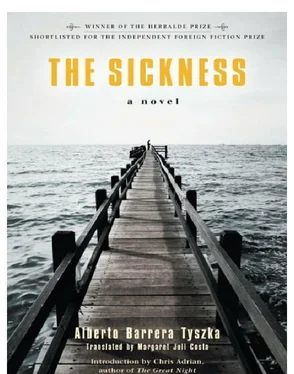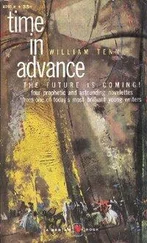“Good afternoon, are you Inés Pacheco?”
“Yes,” says the woman.
What follows is silence, because Andrés doesn’t know how to continue. He’s run out of script, he suddenly finds that he has no idea what to say, and is now hanging from the edge of this scene, afraid he might drop abruptly into the void. The woman is still looking at him, waiting, increasingly bewildered.
Then after a pause, Andrés asks, perplexed: “Don’t you know me? Don’t you know who I am?”
The woman studies him more closely, as if trying to locate Andrés’s face in her memory.
“No,” she says quite naturally.
“I’m Andrés, Javier Miranda’s son.”
Only then does the woman react, and she seems to tense slightly, as if something inside her had cracked. But she still says nothing and makes no move to invite him in. She remains silent, looking at him. Andrés merely watches expectantly.
“I think there’s been some mistake,” she says at last. Her tone of voice is warm, but she pronounces each word rather too exactly, too precisely. “I don’t know who you’re talking about.”
And without letting Andrés add anything further, or giving him a chance to react, she gently closes the door. Andrés stands in silence for a few seconds, taken aback. Then he hears, or thinks he hears, the sound of sandals approaching and then moving off again.
The situation is getting worse all the time. Karina arrives at the office now at half past six in the morning, when the cleaners are just starting work, when the grime and the shadows are still part of the dawn itself. She leaves at eight o’clock in the evening, two hours after finishing her day’s work. Dr. Miranda has urged her to take a vacation too, but she refuses. She watches the time pass on the computer screen, always waiting for the unexpected to happen, for a new e-mail suddenly to appear.
“You’re going mad,” says Adelaida.
“Typhus is less contagious than hysteria,” wrote Joseph Roth. Adelaida doesn’t know these words; she has never read and never will read Joseph Roth, but this is more or less what she thinks too.
“Look at you!” she cries. “Look at the state you’re in over that guy. He’s passed his sickness on to you!”
“It’s your fault,” says Karina in her own defense, albeit rather unconvincingly. “You were the one who persuaded me to start writing to him!”
“That has nothing to do with it. Don’t try and put the blame on me. You’re the one who let that madman poison you.”
Is that the right word? Has she been poisoned? Karina herself wonders the same thing several times a day. It not only has to do with her response to Ernesto Durán’s absence; there’s something worse, something she hasn’t even dared confess to Adelaida, something she may not even want to put into words.
It happened for the first time two Wednesdays ago. On her way home, Karina stopped at a video shop. She thought that perhaps a film would help her overcome the all too frequent bouts of insomnia that had been troubling her lately. She went into the shop at seven o’clock at night, the place was packed, and she was afraid there wouldn’t be any new films available. She went straight to the shelves marked “Comedy.” Perhaps she just needed something to distract her, perhaps that would help her to sleep. However, as she advanced slowly down the narrow aisle, running her eyes over the titles of the films, she began to feel nervous, strangely nervous. It wasn’t something she could describe clearly, but suddenly, the shop seemed much too small; suddenly, she felt hemmed in, unable to move freely, in need of air. A shudder ran through her. Almost a faint electric shock, like a distant nerve tweaking. The voices of the other customers appeared to come at her from varying distances and at different volumes, almost as if they were circling her or dancing, suspended from the shop’s suffocating ceiling. She felt unsteady. Her left eyelid was twitching. As if it had a life of its own. As if it were independent. Her forehead felt cold and clammy too. Her saliva was like sand, difficult to swallow. She couldn’t help thinking again of Ernesto Durán. She grabbed the video that was closest at hand and walked briskly over to the queue at the register.
There were three people ahead of her. Karina couldn’t believe this was happening to her. She tried to calm herself, tried taking deep breaths, clenching her fists and digging her nails into the palms of her hands, as if pain might help her keep control. Inevitably, the same fear she had so often read about began to surface. Was she about to lose consciousness? She wasn’t going to faint right there, was she? To conceal these feelings, she crouched down, pretending to check some detail on her shoes. This allowed her to rest one knee on the floor and to feel safer, steadier, more balanced. This wasn’t her idea. She’d read about it in a letter. Ernesto Durán had told her of something similar happening to him when he was queuing up at the bank. The other customers, of course, haven’t heard that story. Women don’t usually keep bending down to check their shoes while they’re waiting in a queue. Karina was aware of this, but couldn’t help it. Whenever she got up again, she would give a stiff smile, make some gesture, some pointless attempt at explanation. Then she was almost immediately overwhelmed by a terrible feeling of fragility. She was sweating profusely. She felt as if she were hyperventilating, as if a strange weakness were invading her being, as if she could no longer stand the lack of oxygen. There was now only one person ahead of her in the queue. Being able to look outside, through the glass door, was the one thing that gave her a tiny bit of peace, but even that was not enough. Then came a burning sensation, a fierce pricking in her throat. Karina started to scratch her neck. She was afraid it might be an allergy, although she couldn’t help connecting it with the unrelenting feeling of asphyxia. She swayed back and forth on the spot; she stretched out her arms, tried to expand her lungs, took deep breaths through her nose and mouth, rested her hand on the shelf containing sweets to one side of the counter, bent down, checked her shoe again, and straightened up, wiped the sweat from her cheek with one hand, glanced out of the corner of her eye to see if the other people behind her in the queue were looking at her. Then she could stand it no longer. She plonked the film down on top of some chocolate bars and raced out of the shop. Gasping for air, she only got as far as the steps leading out of the small shopping center. She sat down, not caring now or even thinking about the people hurrying past her, their legs almost brushing her.
She doesn’t know how long she sat there. She can only remember feeling that she had been saved. Only just in time, at the very last second. Was this what Ernesto Durán experienced? Was this how he felt? Had she caught it from him, did she suffer the same sickness?
Andrés is studying the results from the latest CT scan. He’s brought them home with him and is sitting on the bed, holding the image up to the light coming in from the window so that he can view his father’s brain. The bluish sheet reveals the spots with a clarity he now finds unbearable. Mystery always helps to make death a little more bearable. All this scientific exactitude is intolerable. What’s the point of it? Who does it help?
Suddenly his hand feels heavy, he finds it hard to keep holding that picture aloft. How many of these has he seen before? Too many. How often has he been faced with definitive images like these? He lost count long ago. After a while, you only count the ones you save, the exceptions. The dead go into a separate account, they keep their own tally. Perhaps he’s remembering that novel by Louis Ferdinand Céline, in which a doctor “described illness as he would describe the face of an old acquaintance.” That is what weighs on Andrés now. His long, long relationship with illness. Perhaps he has seen too many people die.
Читать дальше












